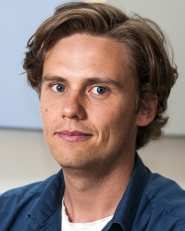
Face-to-face politics: why small states matter
Political scientist Wouter Veenendaal received an NWO Veni grant for his research on the political stability of small states. 'I find small states fascinating, they are almost always excluded from comparative research, while in fact they often challenge existing theories in political science.'

Currently working at the Royal Netherlands Institute of Southeast Asian and Caribbean Studies (KITLV), Veendendaal is one of the 19 Leiden University ‘young outstanding researchers’ who received a Veni grant this year. He was doing research in Curacao when he received the good news. 'The competition was very fierce. I was very excited and proud – especially because I had been waiting for 7 months – so I took the afternoon off to drink a cocktail.'
Explaining political stability in small states
Veendendaal’s Veni research, which he will conduct at both the KITLV and the Institute of Political Science, focuses on the question of why small countries have more stable political systems than large ones – despite the weakness of political structures and strongly personalised politics. 'This project examines the effects of smallness and informal relations on political stability. I will be analysing how personal relations can contribute to the absence of political crises and violence.'
The power of informal politics
'Political scientists often assume that strong political structures, like political parties, create political stability and are a precondition for a functioning democracy. However, small states are significantly more stable than larger states, even though these structures are often lacking or inefficient, and politics is much more personal and informal instead. I therefore want to find out how personal relations and informal politics create a stable political system in these countries.'
Face-to-face communication
Veenendaal will build on his PhD research at the Institute of Political Science on politics and democracy in microstates. Now, in addition to a comparative study of elite relations of all 46 small states, he will also be doing research through in-depth interviews in 4 specific countries: Malta in Europe, Suriname in the Caribbean, Comoros in Africa, and Vanuatu in the Pacific.
Studying officials in these countries has its pros and cons: 'In my experience, interviewing political officials in small states is quite easy because they are more accessible to researchers than in larger countries; not used to being interviewed by foreign researchers, they are often more willing to share their experiences. However, since they are used to communicating face-to-face, making appointments for interviews beforehand, by e-mail, can be a challenge.'

Book on democracy
Veenendaal is looking forward to conducting his own research and building on his research agenda. 'And to collaborating with other researchers in my field and in the small states that I will be studying. The project builds on the existing collaboration with Dr Jack Corbett (Southampton University), and our proposal for a book about democracy in small states has just been accepted by Oxford University Press. This book will be an important component of the Veni project.'
How to get a Veni
Collaboration with his colleagues from the KITLV and the Institute of Political Science was a vital element in applying for the Veni too. 'During the application process, I learned that support from colleagues with different kinds of experiences and perspectives is really important. Also, I realised that writing a grant proposal is very different from the academic writing that I normally do; you really have to sell your ideas and plans, and you have to do it in only 2,000 words. Therefore, my advice to future Veni applicants would be to first write the 300 words summary, forcing yourself to immediately get to the core of your proposal.'
